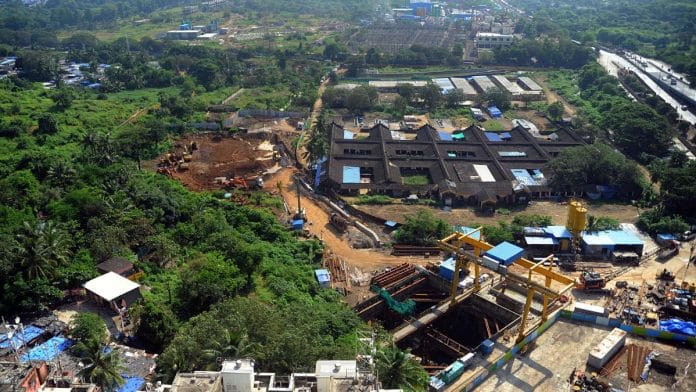New Delhi: Only 50 percent of trees in the compensatory afforestation that was carried out in lieu of 20,000 trees axed in Aarey forest area for the construction of Mumbai Metro sheds in 2018-19 have survived, discloses a report placed Monday in the Supreme Court.
Prepared by the Conservator of Forests & Director, Maharashtra Government, the report pointed out that the Mumbai Metro Rail Corporation Limited (MMRCL) had planted 20,460 seedlings under the compensatory afforestation and Corporate Social Responsibility (CSR) schemes.
Based on field verification and available records, it has been found that “out of the total planted 20,460 seedlings, approximately 50 percent of the saplings have survived”.
The report was prepared subsequent to an order of the Supreme Court that sought a status report on the plantation work undertaken during the Mumbai Metro shed construction work.
On 14 August, a bench led by Chief Justice B.R. Gavai had issued the directive to Mumbai’s Forest Conservator to place on record an affidavit, including photographs, showing the present status of the compensatory afforestation by MMRCL in the last decade.
The directive came while the bench was hearing an application filed by the Tree Authority of the Municipal Corporation of Greater Mumbai, seeking the court’s permission to fell 1,134 trees for the completion of the Goregaon-Mulund Link Road Project, located in Filmcity, Goregaon to Khindipada, Mulund. The project proponent, chief engineer of the Bridges Department of the Municipal Corporation, had submitted a proposal to the Tree Authority, which moved SC for appropriate permission.
While doing so, the bench had then allowed the project proponent to go ahead with the felling of 95 trees, subject to the condition that it would plant 1,344 trees in lieu of the ones being axed.
While the court awaited the report’s submission, the Tree Authority filed another application, urging the bench to permit chopping of the remaining 1,039 trees for the expeditious completion of the link project, in public interest.
On Monday, after seeing the forest conservator’s report, the CJI’s bench deferred it’s decision on the application and asked the state government to update the court about what steps it plans to take care of the saplings (planted in lieu of the felling in Aarey forest). The bench told the counsel that it would not give any permission until the state satisfies the court about its proposed action.
According to the report, a copy of which ThePrint has accessed, a site visit was conducted on 19 September by the Deputy Director (South) of Sanjay Gandhi National Park and it was observed that overall growth and condition of the surviving plants is irregular and stunted.
During the inspection, it was noted that certain patches exhibited moderate survival, indicating the need for continued maintenance and care.
In some areas, natural factors such as poor soil depth, water scarcity, and other external disturbances have adversely affected the growth and survival of the seedlings.
“Furthermore, the chain-link fencing constructed around the plantation area has partially collapsed or deteriorated at several points, exposing the plantation to grazing and encroachment risks,” the report revealed.
It further said: “To ensure the long-term sustainability and full establishment of the plantation, it is recommended that adequate protection measures be implemented to safeguard the site from biotic interference and external damage.”
At Ramgad plantation area, one of the sites where compensatory afforestation took place, it was observed that although plantation was recorded in the official register and documents, no visible plantation could be identified on the site.
The report also noticed discrepancies in official documents on the plantation. It said the available records do not provide information on the species-wise distribution of plantation.
Additionally, the physical inspection also revealed that the water pipeline system in the plantation area was completely damaged, with only a single pipeline remaining, which is operated through a solar-powered motor pump.
“This situation indicates the need for proper documentation, monitoring, and maintenance to ensure plantation’s survival and effective management,” submitted the report.
(Edited by Viny Mishra)
Also read: Over 3.68 lakh trees to be ‘affected’ for Adani mining project in Chhattisgarh, Centre tells LS






